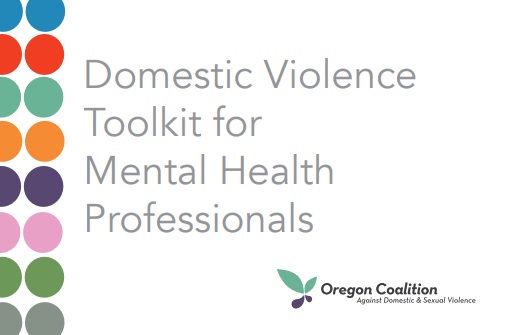Resources Library:
Start a Search:
Domestic Violence Toolkit for Mental Health Professionals

The Oregon Coalition Against Domestic & Sexual Violence (OCADSV) provides a toolkit for mental health professionals to better understand the links between mental health and domestic violence. It examines how DV is expressed and what that poses for those who are impacted by these forms of DV.
Don’t Ask, Can’t Report - A Practical Guide to Collecting Data on Lesbian, Gay, Bisexual & Transgender People in a Culturally Responsive Way
Lesbian, gay, bisexual, and transgender (LGBT) people are included - but often invisible - in many evaluations. In light of increased federal attention to LGBT-specific data collection and the growing awareness of disparities faced by this population, evaluators must be prepared to consider how programs and policies affect LGBT people. However, evaluators are often at a loss for the best ways to ask about sexual orientation. Furthermore, we may inadvertently ask questions about gender in ways that marginalize transgender people, making them invisible to researchers and service providers. This skill-building workshop provided best practices for assessing sexual orientation and gender identity in youth and adult populations. Cutting-edge research on item development was shared, giving participants concrete ways to ask questions, and ways to make their evaluations more inclusive of sexual minorities.
Educational Rights of Homeless Children and Youth
We know that many of you work in programs work on behalf of children and youth everyday addressing a wide range of educational issues, including but not limited to, addressing safety needs associated with attending school, helping kids transition to schools, and general academic support. Recognizing that children and youth experiencing homelessness often have difficulty in school, there has been efforts to put policies and practices in place to protect the rights of all students and ensure access to services to support success in school.
In December 2015, the President signed into law the Every Student Succeeds Act of 2015 (ESSA), which ensures that education of homeless students. The law takes effect this October. Below are links to some basic fact sheets on this new law:
• Homeless Student Fact Sheet and Rights
• U.S. Department of Education Guidance. This document also provides specific guidance on protecting the privacy of homeless children exposed to or experiencing domestic violence.
• Information of Shelters and Advocates. This will also take to you to a link to find the Student Services Liaison in your community.
We hope this information helps you better understand the variety of rights of students, as well as provide you information on services in the community that are available to you to advocate on behalf of homeless students in your community.
The College of William and Mary the Education of Homeless Youth program for the Department of Education in Virginia. More information can be found on the program's website.
Effects of Racism on Domestic Violence Resources
This article examines how racism affects African-American women in terms of domestic violence. Racism alters how African American women receive treatment through domestic violence resources and how they perceive resources. Because of racism, African American women have specific concerns when making decisions about domestic violence relationships and what resources would be best for them.
Elder Abuse and Domestic Violence in Later Life: Innovative New Resources for the Community
This archived webinar and power point presentation address the issues of elder abuse and domestic violence in later life. Additionally, they provide the faith-based community, service providers in aging and violence prevention and other interested individuals with a key new resource to help them respond appropriately and assist people in abusive situations to get the help they need. Lisa Furr with the Virginia Center on Aging and Adrienne Johnson with SeniorNavigator presented with Dr. E. Ayn Welleford (Virginia Commission on Alzheimer’s Disease and Related Disorders/Virginia Commonwealth University) moderating.

